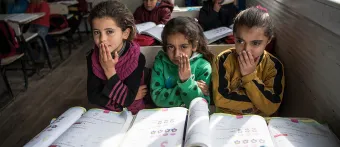State Institutions and Regime Networks as Service Providers in Syria

State Institutions and Regime Networks as Service Providers in Syria
Part of the Syria Transition Challenges Project
The physical and economic destruction caused by the conflict has significantly affected state institutions and its capacity to deliver services, compared to the years prior to 2011. Currently, the Syrian government lacks the ability to improve the socio-economic situation for large sectors of the population and to provide adequate social services. After the Syrian Pound (SYP) suffered a major depreciation at the end of 2019, the situation deteriorated for the majority of Syrians. The socio-economic impact of COVID-19 could lead Syria into a deeper crisis.
The drain of state resources has pushed the government to concentrate its rehabilitation and early recovery efforts in areas that remained under its rule throughout the war, while deprioritising the recaptured territories with less public investment and service provision. The reconquered areas are still considered as hostile entities by Damascus. The burden of public service provision has fallen on the Syrian Arab Red Crescent (SARC) in collaboration with UN agencies and INGOs, which often fund the majority of the programs in recaptured areas. The services provided by these institutions were however limited to basic services, especially medical assistance, while rehabilitation of health, education and energy infrastructures are still lacking.
The Syrian government security forces have also (re)imposed a repressive and securitised atmosphere on the populations that remained or returned to former opposition held areas. The combination of state neglect and repression in Daraa and some areas of rural Damascus has led to increasing discontent.
After years of war, the alternative to the Syrian government is unclear. The destruction of wide sectors of the economy have strengthened the state’s institutions as the main provider of services and the main employer. Large segments of the population are dependent on the state for wages or assistance, despite having been weakened in absolute terms compared to before 2011.
From this perspective, the actions of organisations connected to the inner circles of power in Damascus, such as the Syrian Arab Red Crescent and Syria Trust for Development, consolidate the regime by capturing international humanitarian funds and manipulating humanitarian assistance. Businessmen’s charity initiatives and the mobilisation of Baath party networks act to ensure regime stability and reinforce its clientelist and power networks. They operate as tools and instruments to control society.
State institutions are marked by contradictory but connected features: a source of authority as an employer and provider in a devastated economy and society with limited alternatives, and a source of frustration and discontent because of its shortcomings, unequal and unjust delivery rooted in authoritarianism and clientelism.
The ideas expressed are of the author’s not the publisher
Published in June 2020
All rights reserved to GCSP and EUI
Joseph Daher is Part-Time Professor at the EUI. He completed a Doctorate in Development Studies at SOAS, University of London (2015), and a Doctorate in Political Science at Lausanne University (2018), Switzerland. He currently teaches at Lausanne University and is a part time affiliate professor at the European University Institute, Florence (Italy). He is the author of Hezbollah: Political Economy of the Party of God (Pluto Press, 2016) and Syria After the Uprisings: The Political Economy of State Resilience (Pluto Press 2019).
